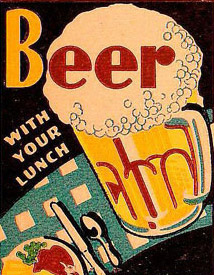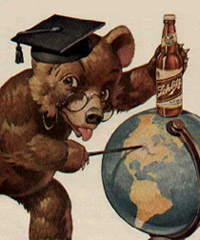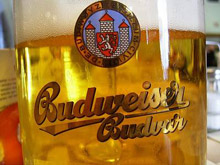 Last night we ate leftover smoked meat and drank Southern Tier Choklat. One, then the other. No pairing involved. Sometimes you just want a beer, maybe even a strong one.
Last night we ate leftover smoked meat and drank Southern Tier Choklat. One, then the other. No pairing involved. Sometimes you just want a beer, maybe even a strong one.
Choklat, an 11% abv imperial stout infused with dark Belgian chocolate, qualifies on both counts. It’s one of the beers I’ll be writing around 85 words about in the next All About Beer magazine Beer Talk.
You’ll notice these days that more often than not Beer Talk panelists suggest a food pairing for the beer they are describing. I tend to be the slacker. I know that Charles Finkel, who tastes the same beers as I, will have terrific suggestions and I try to use the small space alloted to squeeze in something different.
I’m keener than most about the notion beer belongs at the table, but these days the movement hardly seems to need my help. For instance, the Brewers Association yesterday revealed new details about “SAVOR: An American Craft Beer & Food Experience,” including something called educational salons. These are presentations by “savvy cross drinkers.”
I guarantee you that the words “Beer is the new wine” will be bandied about.
What does that mean? I really don’t know. The phrase doesn’t seem to serve beer or wine well. Wine is the new wine. Beer is the new beer. (And the old beer, which is equally important.)
Beer “styles” have always evolved, with various riffs sometimes turning evolution into revolution. This is nothing new. In the 1930s it was the monks at Westmalle refining the “tripel” style. These days it might be two brothers in a former hardware store in Warren, Mich., inventing something new or an ex-English major in San Diego blending mead, strong ale and sour beer to create Veritas (Latin for truth).
Truth is it’s still beer.
NEW BEER RULE #7: Beer is still beer.
 Were I inclined to make predictions (not likely) about the Top 10 Beer Trends of 2008 then one would somehow have to include the words “education” and “certification.”
Were I inclined to make predictions (not likely) about the Top 10 Beer Trends of 2008 then one would somehow have to include the words “education” and “certification.” Would the beer world be a better place if Budweiser bought Budweiser?
Would the beer world be a better place if Budweiser bought Budweiser?